案例22:马斯特里赫特条约
欧洲联盟运作方式条约

欧洲联盟运作方式条约一、引言欧洲联盟(European Union,简称EU)是一个由28个成员国组成的政治和经济联盟。
为了确保成员国之间的合作和协调,欧盟制定了一系列条约和法律来规范其运作方式。
其中最重要的一份文件就是欧洲联盟运作方式条约(Treaty on European Union),也被称为《马斯特里赫特条约》(Treaty of Maastricht)。
本文将详细介绍欧洲联盟运作方式条约的背景、内容和影响。
二、背景随着二战结束后欧洲国家之间的合作步伐加快,1957年签署的《罗马条约》奠定了欧洲经济共同体(EEC)的基础。
随着时间推移,原有的经济共同体逐渐发展为更加广泛的政治和经济合作组织,最终形成了现在的欧洲联盟。
为了更好地适应新形势下的合作需求,1992年签署了《马斯特里赫特条约》,该条约正式生效于1993年11月1日。
该条约对欧洲联盟的组织结构、权力分配和政策制定等方面进行了重大改革。
三、条约内容《马斯特里赫特条约》涵盖了许多方面的内容,包括欧洲联盟的目标、机构设置、权力分配、政策制定和经济合作等。
1.欧洲联盟的目标:条约明确了欧洲联盟的目标,包括促进和加强成员国之间的经济和社会进一步整合,推动共同外交和安全政策,以及保护人权和民主原则。
2.机构设置:条约规定了欧洲联盟的主要机构,包括欧洲委员会、欧洲议会、理事会和法院等。
这些机构负责制定政策、决策和监督执行情况。
3.权力分配:条约明确了各个机构之间的权力分配和合作关系。
例如,欧洲委员会负责提出立法建议,欧洲议会负责审议并投票决定是否通过。
理事会则负责协调成员国之间的利益,并最终做出决策。
4.政策制定:条约规定了欧洲联盟在各个政策领域的职责和权限。
例如,共同决策程序适用于内部市场、环境保护、人权和竞争政策等领域。
5.经济合作:条约强调了成员国之间的经济合作,包括货物、服务、资本和劳动力的自由流动。
此外,条约还规定了共同农业政策、区域发展基金和结构基金等经济合作机制。
1992-1993年欧洲货币危机案例
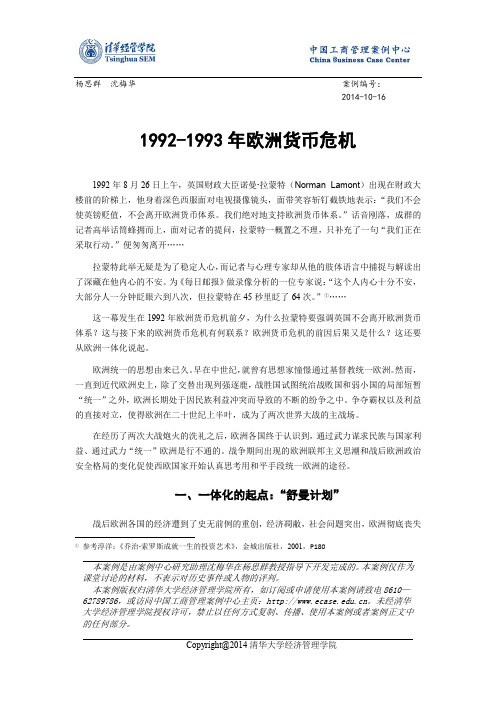
本案例是由案例中心研究助理沈梅华在杨思群教授指导下开发完成的。
本案例仅作为课堂讨论的材料,不表示对历史事件或人物的评判。
本案例版权归清华大学经济管理学院所有,如订阅或申请使用本案例请致电8610—62789786,或访问中国工商管理案例中心主页: 。
未经清华大学经济管理学院授权许可,禁止以任何方式复制、传播、使用本案例或者案例正文中的任何部分。
杨思群 沈梅华 案例编号:2014-10-161992-1993年欧洲货币危机1992年8月26日上午,英国财政大臣诺曼∙拉蒙特(Norman Lamont )出现在财政大楼前的阶梯上,他身着深色西服面对电视摄像镜头,面带笑容斩钉截铁地表示:“我们不会使英镑贬值,不会离开欧洲货币体系。
我们绝对地支持欧洲货币体系。
”话音刚落,成群的记者高举话筒蜂拥而上,面对记者的提问,拉蒙特一概置之不理,只补充了一句“我们正在采取行动。
”便匆匆离开……拉蒙特此举无疑是为了稳定人心,而记者与心理专家却从他的肢体语言中捕捉与解读出了深藏在他内心的不安。
为《每日邮报》做录像分析的一位专家说:“这个人内心十分不安,大部分人一分钟眨眼六到八次,但拉蒙特在45秒里眨了64次。
”①……这一幕发生在1992年欧洲货币危机前夕,为什么拉蒙特要强调英国不会离开欧洲货币体系?这与接下来的欧洲货币危机有何联系?欧洲货币危机的前因后果又是什么?这还要从欧洲一体化说起。
欧洲统一的思想由来已久。
早在中世纪,就曾有思想家憧憬通过基督教统一欧洲。
然而,一直到近代欧洲史上,除了交替出现列强逐鹿,战胜国试图统治战败国和弱小国的局部短暂“统一”之外,欧洲长期处于因民族利益冲突而导致的不断的纷争之中。
争夺霸权以及利益的直接对立,使得欧洲在二十世纪上半叶,成为了两次世界大战的主战场。
在经历了两次大战炮火的洗礼之后,欧洲各国终于认识到,通过武力谋求民族与国家利益、通过武力“统一”欧洲是行不通的。
战争期间出现的欧洲联邦主义思潮和战后欧洲政治安全格局的变化促使西欧国家开始认真思考用和平手段统一欧洲的途径。
马斯特里赫特条约内容_马斯特里赫特条约意义
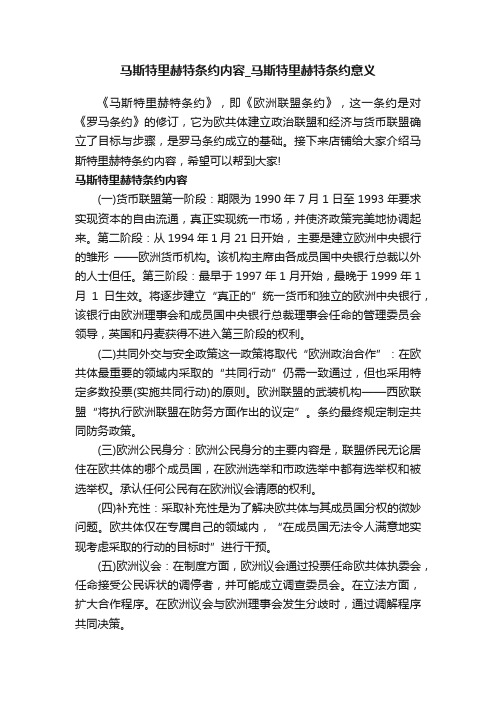
马斯特里赫特条约内容_马斯特里赫特条约意义《马斯特里赫特条约》,即《欧洲联盟条约》,这一条约是对《罗马条约》的修订,它为欧共体建立政治联盟和经济与货币联盟确立了目标与步骤,是罗马条约成立的基础。
接下来店铺给大家介绍马斯特里赫特条约内容,希望可以帮到大家!马斯特里赫特条约内容(一)货币联盟第一阶段:期限为1990年7月1日至1993年要求实现资本的自由流通,真正实现统一市场,并使济政策完美地协调起来。
第二阶段:从1994年1 月21 日开始,主要是建立欧洲中央银行的雏形——欧洲货币机构。
该机构主席由各成员国中央银行总裁以外的人士但任。
第三阶段:最早于1997年1月开始,最晚于1999年1月1日生效。
将逐步建立“真正的”统一货币和独立的欧洲中央银行,该银行由欧洲理事会和成员国中央银行总裁理事会任命的管理委员会领导,英国和丹麦获得不进入第三阶段的权利。
(二)共同外交与安全政策这一政策将取代“欧洲政治合作”:在欧共体最重要的领域内采取的“共同行动”仍需一致通过,但也采用特定多数投票(实施共同行动)的原则。
欧洲联盟的武装机构——西欧联盟“将执行欧洲联盟在防务方面作出的议定”。
条约最终规定制定共同防务政策。
(三)欧洲公民身分:欧洲公民身分的主要内容是,联盟侨民无论居住在欧共体的哪个成员国,在欧洲选举和市政选举中都有选举权和被选举权。
承认任何公民有在欧洲议会请愿的权利。
(四)补充性:采取补充性是为了解决欧共体与其成员国分权的微妙问题。
欧共体仅在专属自己的领域内,“在成员国无法令人满意地实现考虑采取的行动的目标时”进行干预。
(五)欧洲议会:在制度方面,欧洲议会通过投票任命欧共体执委会,任命接受公民诉状的调停者,并可能成立调查委员会。
在立法方面,扩大合作程序。
在欧洲议会与欧洲理事会发生分歧时,通过调解程序共同决策。
(六)执委员欧共体执委会职能不变:但是由于任命方式改变,它的合法地位增强。
(七)司法与内政:需要一致通过的政府问合作今后将涉及与“共同利益”有关的问题(避难:移民,签证、警察)。
案例索罗斯狙击泰铢

案例索罗斯狙击泰铢索罗斯几次经典之作1992年英镑受到攻击,缘于当时欧洲汇率机制陷入困境。
从1979年开始启动的欧洲汇率机制,是计划中建立欧洲单一货币(欧元)的第一阶段,这种机制要求参与的欧洲各国货币汇率在一个规定范围内浮动。
由于德国在欧洲经济中的火车头地位,德国联邦银行作为欧洲汇率机制的基础,担当着欧洲央行的职责,所以核心汇率是以德国马克为基准。
一旦汇率浮动超出这一范围,各成员国中央银行有义务进行干预。
1992年2月马斯特里赫特条约签订,欧洲联盟12个成员国就建立欧元提出了具体的时间表,将在2000年前建立欧洲中央银行和单一的货币。
1989年两德统一,为稳定东德民心,东德货币以高汇率兑换西德马克,同时西德投资巨额资金帮助东德发展经济。
这样德国政府由于承担两德统一的巨大开支而面临通货膨胀的压力,不得不维持高利率以抑制通胀,给欧洲其他货币带来巨大的贬值压力。
这样作为欧洲央行职责的德国央行就面临着两难选择:欧洲各国要求德国马克降息以刺激疲弱的欧洲经济,而德国国内却承受着日益严重的通胀威胁。
为欧洲抑或为德国,这是个问题,考验着德国政府的智慧。
此时,英国作为老牌的日不落帝国逐渐日薄西山,国内经济严重衰退,这样英镑作为欧洲货币体制的一部分面临着两难困局:为国际地位计,必须维持高利率,使汇价不致走软;为国内经济计,必须降息以刺激投资及消费。
1992年7月就有6位英国货币专家联名写信给伦敦《泰晤士报》,要求英国政府降低利率以克服经济的不景气,甚至考虑从欧洲汇率机制中退出。
对于英国政府来说,可以降低利率,但前提是德国也降低利率,否则将意味着英镑与马克之间汇率联系的破裂。
索罗斯看准了这个机会,他认为实力强大的德国央行的态度将起到决定性的作用,德国人不可能降息,不可能为了英国(还有西班牙、意大利)而使自己的国家付出代价。
而英国的高利率绝对维持不下去,英镑贬值势在必然~索罗斯甚至放出豪言:英国人必将为自己的愚蠢付出惨重的代价~1992年9月,索罗斯以“量子基金”资产做抵押,从银行借了50亿英镑,按1:的汇率(当时),兑换成139.5亿德国马克。
马斯特里赫特条约内容
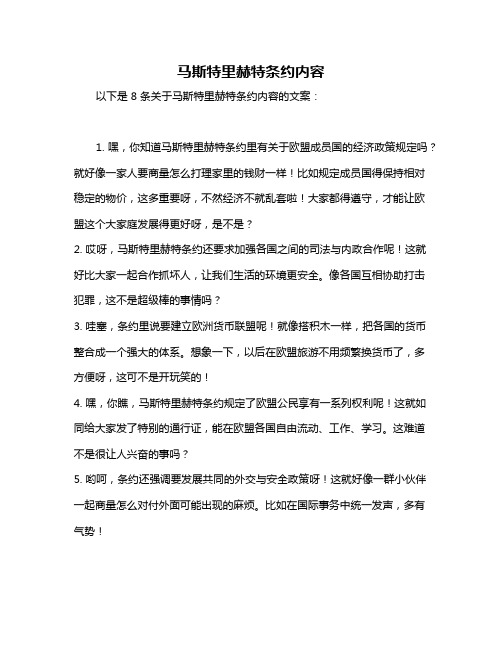
马斯特里赫特条约内容以下是 8 条关于马斯特里赫特条约内容的文案:1. 嘿,你知道马斯特里赫特条约里有关于欧盟成员国的经济政策规定吗?就好像一家人要商量怎么打理家里的钱财一样!比如规定成员国得保持相对稳定的物价,这多重要呀,不然经济不就乱套啦!大家都得遵守,才能让欧盟这个大家庭发展得更好呀,是不是?2. 哎呀,马斯特里赫特条约还要求加强各国之间的司法与内政合作呢!这就好比大家一起合作抓坏人,让我们生活的环境更安全。
像各国互相协助打击犯罪,这不是超级棒的事情吗?3. 哇塞,条约里说要建立欧洲货币联盟呢!就像搭积木一样,把各国的货币整合成一个强大的体系。
想象一下,以后在欧盟旅游不用频繁换货币了,多方便呀,这可不是开玩笑的!4. 嘿,你瞧,马斯特里赫特条约规定了欧盟公民享有一系列权利呢!这就如同给大家发了特别的通行证,能在欧盟各国自由流动、工作、学习。
这难道不是很让人兴奋的事吗?5. 哟呵,条约还强调要发展共同的外交与安全政策呀!这就好像一群小伙伴一起商量怎么对付外面可能出现的麻烦。
比如在国际事务中统一发声,多有气势!6. 哎呀呀,马斯特里赫特条约有关于促进社会团结与就业的内容呢!不就是为了让大家都能过得幸福,有工作嘛,这多实在呀!就像关心家人一样关心每一个成员国的人民,这多暖人心呐!7. 哇哦,这个条约还对欧盟的机构设置和决策程序做了规定呢!就好比给一个大机器设置好了各种零件和运行规则,让它能顺畅地运转起来。
这多关键呀,不然不就乱套了嘛!8. 哈哈,马斯特里赫特条约啊,真的是太重要啦!它就像一个大蓝图,指引着欧盟不断前进和发展。
里面的每一条内容都关系着欧盟的未来,关系着我们大家的生活呢!我们真应该好好去了解它,不是吗?我的观点结论是:马斯特里赫特条约对欧盟的构建和发展起着至关重要的作用,其内容丰富且影响深远,值得我们深入研究。
马斯特里和特条约
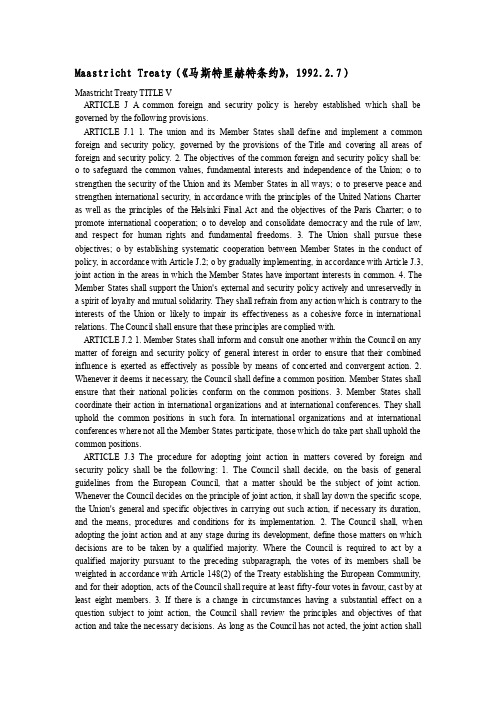
Maastricht Treaty(《马斯特里赫特条约》,1992.2.7)Maastricht Treaty TITLE VARTICLE J A common foreign and security policy is hereby established which shall be governed by the following provisions.ARTICLE J.1 1. The union and its Member States shall define and implement a common foreign and security policy, governed by the provisions of the Title and covering all areas of foreign and security policy. 2. The objectives of the common foreign and security policy shall be: o to safeguard the common values, fundamental interests and independence of the Union; o to strengthen the security of the Union and its Member States in all ways; o to preserve peace and strengthen international security, in accordance with the principles of the United Nations Charter as well as the principles of the Helsinki Final Act and the objectives of the Paris Charter; o to promote international cooperation; o to develop and consolidate democracy and the rule of law, and respect for human rights and fundamental freedoms. 3. The Union shall pursue these objectives; o by establishing systematic cooperation between Member States in the conduct of policy, in accordance with Article J.2; o by gradually implementing, in accordance with Article J.3, joint action in the areas in which the Member States have important interests in common. 4. The Member States shall support the Union's external and security policy actively and unreservedly in a spirit of loyalty and mutual solidarity. They shall refrain from any action which is contrary to the interests of the Union or likely to impair its effectiveness as a cohesive force in international relations. The Council shall ensure that these principles are complied with.ARTICLE J.2 1. Member States shall inform and consult one another within the Council on any matter of foreign and security policy of general interest in order to ensure that their combined influence is exerted as effectively as possible by means of concerted and convergent action. 2. Whenever it deems it necessary, the Council shall define a common position. Member States shall ensure that their national policies conform on the common positions. 3. Member States shall coordinate their action in international organizations and at international conferences. They shall uphold the common positions in such fora. In international organizations and at international conferences where not all the Member States participate, those which do take part shall uphold the common positions.ARTICLE J.3 The procedure for adopting joint action in matters covered by foreign and security policy shall be the following: 1. The Council shall decide, on the basis of general guidelines from the European Council, that a matter should be the subject of joint action. Whenever the Council decides on the principle of joint action, it shall lay down the specific scope, the Union's general and specific objectives in carrying out such action, if necessary its duration, and the means, procedures and conditions for its implementation. 2. The Council shall, when adopting the joint action and at any stage during its development, define those matters on which decisions are to be taken by a qualified majority. Where the Council is required to act by a qualified majority pursuant to the preceding subparagraph, the votes of its members shall be weighted in accordance with Article 148(2) of the Treaty establishing the European Community, and for their adoption, acts of the Council shall require at least fifty-four votes in favour, cast by at least eight members. 3. If there is a change in circumstances having a substantial effect on a question subject to joint action, the Council shall review the principles and objectives of that action and take the necessary decisions. As long as the Council has not acted, the joint action shallstand. 4. Joint actions shall commit the Member States in the positions they adopt and in the conduct of their activity. 5. Whenever there is any plan to adopt a national position or take national action pursuant to a joint action, information shall be provided in time to allow, if necessary, for prior consultations within the Council. The obligation to provide prior information shall not apply to measures which are merely a national transposition of Council decisions. 6. In cases of imperative need arising from changes in the situation and failing a Council decision, Member States may take the necessary measures as a matter of urgency having regard to the general objectives of the joint action. The Member State concerned shall inform the Council immediately of any such measures. 7. Should there be any major difficulties in implementing a joint action, a Member State shall refer them to the Council which shall discuss them and seek appropriate solutions. Such solu-tions shall not run counter to the objectives of the joint action or impair its effectiveness.ARTICLE J.4 1. The common foreign and security policy shall include all questions related to the security of the Union, including the eventual framing of a common defence policy, which might in time lead to a common defence. 2. The union requests the Western European Union (WEU), which is an integral part of the development of the Union, to elaborate and implement decisions and actions of the Union which have defence implications. The Council shall, in agreement with the institutions of the WEU, adopt the necessary practical arrangements. 3. Issues having defence implications dealt with under this Article shall not be subject to the procedures set out in Article J.3. 4. The policy of the Union in accordance with this Article shall not prejudice the specific character of the security and defence policy of certain Member States and shall respect the obligations of certain Member States under the North Atlantic Treaty and be compatible with the common security and defence policy established within that framework. 5. The provisions of this Article shall not prevent the development of closer cooperation between two or more Member States on a bilateral level, in the framework of the WEU and the Atlantic Alliance, provided such cooperation does not run counter to or impede that provided for in this Title. 6. With a view to furthering the objective of this Treaty, and having in view the date of 1998 in the context of Article XII of the Brussels Treaty, the provisions of this Article may be revised as provided for in Article N(2) on the basis of a report to be presented in 1996 by the Council to the European Council, which shall include an evaluation of the progress made and the experience gained until then.ARTICLE J.5 1. The Presidency shall represent the Union in matters coming within the common foreign and security policy. 2. The Presidency shall be responsible for the implementation of common measures; in that capacity it shall in principle express the position of the Union in international organizations and international conferences. 3. In the tasks referred to in paragraphs 1 and 2, the presidency shall be assisted if needs be by the previous and next Member States to hold the Presidency. The Commission shall be fully associated in these tasks. 4. Without prejudice to Article J.2(3) and Article J.3(4), Member States represented in international organizations or international conferences where not all the Member States participate shall keep the latter informed of any matter of common interest. Member States which are also members of the United Nations Security Council will concert and keep the other Member States fully informed. Member States which are permanent members of the Security Council will, in the execution of their functions, ensure the defence of the positions and the interests of the union, without prejudice to their responsibilities under the provisions of the United Nations Charter. ARTICLE J.6 The diplomatic and consular missions of the Member States and the Commission Delegations in thirdcountries and international conferences, and their representations to international organizations, shall cooperate in ensuring that the common positions and common measures adopted by the Council are complied with and implemented. They shall step up cooperation by exchanging information, carrying out joint assessments and contributing to the implementation of the provisions referred to in Article 8c of the Treaty establishing the European Community.ARTICLE J.7 The Presidency shall consult the European Parliament on the main aspects and the basic choices of the common foreign and security policy and shall ensure that the views of the European Parliament are duly taken into consideration. The European Parliament shall be kept regularly informed by the Presidency and the Commission of the development of the Union's foreign and security policy. The European Parliament may ask questions of the Councils or make recommendations to it. It shall hold an annual debate on progress in implementing the common foreign and security policy.ARTICLE J.8 1. The European Council shall define the principles of and general guidelines for the common foreign and security policy. 2. The Council shall take the decisions necessary for defining and implementing the common foreign and security policy on the basis of the general guidelines adopted by the European Council. It shall ensure the unity, consistency and effectiveness of action by the Union. The Council shall act unanimously, except for procedural questions and in the case referred to in Article J.3(2). 3. Any Member State or the Commission may refer to the Council any question relating to the common foreign policy and may submit proposals to the Council. 4. In cases requiring a rapid decision, the Presidency, of its own motion, or at the request of the Commission or a Member State, shall convene an extraordinary Council meeting within forty-eight hours or, in an emergency, within a shorter period. 5. Without prejudice to Artic le 151 of the Treaty establishing the European Community, a Political Committee consisting of Political Directors shall monitor the international situation in the areas covered by common foreign and security policy and contribute to the definition of policies by delivering opinions to the Council at the request of the Council or on its own initiative. It shall also monitor the implementation of agreed policies, without prejudice to the responsibility of the Presidency and the Commission.ARTICLE J.9 The Commission shall be fully associated with the work carried out in the common foreign and security policy field. ARTICLE J.10 On the occasion of any review of the security provisions under Article J.4, the Conference which is convened to that effect shall also examine whether any other amendments need to be made to provisions relating to the common foreign and security policy.ARTICLE J.11 1. The provisions referred to in Articles 137, 138, 139 to 142, 146, 147, 150 to 153, 157 to 163 and 217 of the Treaty establishing the European Community shall apply to the provisions relating to the areas referred to in this Title. 2. Administrative expenditure which the provisions relating to the areas referred to in this Title entail for the institutions shall be charged to the budget of the European Communities. The Council may also: o either decide unanimously that operational expenditure to which the implementation of those provisions gives rise is to be charged to the budget of the European Communities; in that event, the budgetary procedure laid down in the Treaty establishing the European Community shall be applicable; o or determine that such expenditure shall be charged to the Member States, where appropriate in accordance with a scale to be decided.。
欧洲联盟条约(马斯特里赫特条约)六
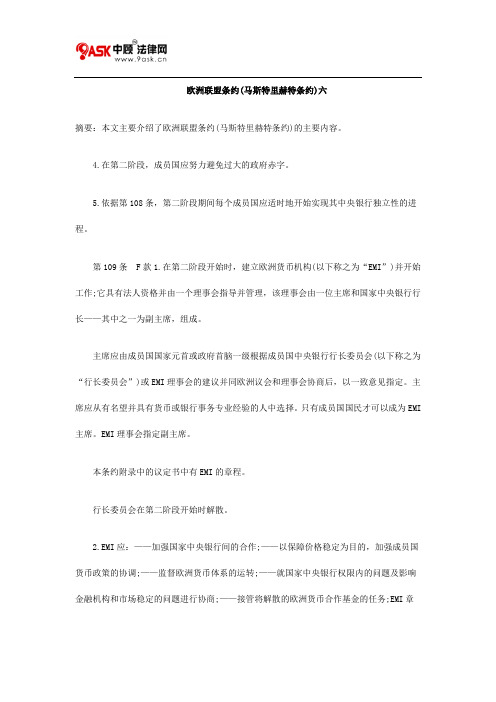
欧洲联盟条约(马斯特里赫特条约)六摘要:本文主要介绍了欧洲联盟条约(马斯特里赫特条约)的主要内容。
4.在第二阶段,成员国应努力避免过大的政府赤字。
5.依据第108条,第二阶段期间每个成员国应适时地开始实现其中央银行独立性的进程。
第109条F款1.在第二阶段开始时,建立欧洲货币机构(以下称之为“EMI”)并开始工作;它具有法人资格并由一个理事会指导并管理,该理事会由一位主席和国家中央银行行长——其中之一为副主席,组成。
主席应由成员国国家元首或政府首脑一级根据成员国中央银行行长委员会(以下称之为“行长委员会”)或EMI理事会的建议并同欧洲议会和理事会协商后,以一致意见指定。
主席应从有名望并具有货币或银行事务专业经验的人中选择。
只有成员国国民才可以成为EMI 主席。
EMI理事会指定副主席。
本条约附录中的议定书中有EMI的章程。
行长委员会在第二阶段开始时解散。
2.EMI应:——加强国家中央银行间的合作;——以保障价格稳定为目的,加强成员国货币政策的协调;——监督欧洲货币体系的运转;——就国家中央银行权限内的问题及影响金融机构和市场稳定的问题进行协商;——接管将解散的欧洲货币合作基金的任务;EMI章程规定了解散的程式;——促进ECU的使用及监视其发展,其中包括ECU清算机制的顺利运行。
;3.为了准备第三阶段,EMI应:——准备第三阶段实施单一的货币政策所必需的工具和程序;——在需要时,促进在其权限范围内指导统计的收集、编辑和分类的规则和作法的协调。
——准备国家中央银行在ESCB框架内运行操作的条例;——提高跨国界支付的效率;——监督管理ECU钞票的技术准备工作。
最晚在1996年12月31日,EMI应详细说明ESCB完成其第三阶段的任务所必需的规章、组织和逻辑框架。
该框架应在ECB成立之日提交给ECB以做出决定。
4.EMI经理事会成员2/3多数同意可以:——就货币政策和汇率政策的总方针以及每个成员国所采取的有关措施的基本方针提出意见或建议;——向成员国政府和理事会提交对可能影响共同体内部或外部金融状况,特别是欧洲货币体系运作的政策的意见或建议;——向成员国货币当局就其货币政策的实施提出建议。
从《马斯特里赫特条约》到《里斯本条约》
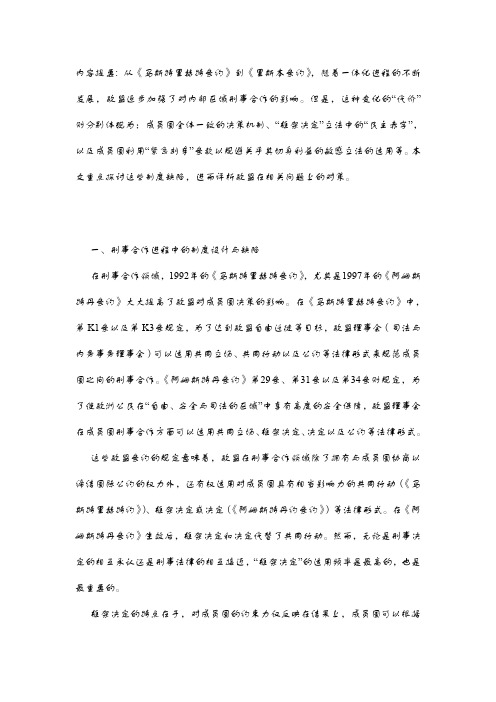
内容提要: 从《马斯特里赫特条约》到《里斯本条约》,随着一体化进程的不断发展,欧盟逐步加强了对内部区域刑事合作的影响。
但是,这种变化的“代价”则分别体现为:成员国全体一致的决策机制、“框架决定”立法中的“民主赤字”,以及成员国利用“紧急刹车”条款以规避关乎其切身利益的敏感立法的适用等。
本文重点探讨这些制度缺陷,进而评析欧盟在相关问题上的对策。
一、刑事合作进程中的制度设计与缺陷在刑事合作领域,1992年的《马斯特里赫特条约》,尤其是1997年的《阿姆斯特丹条约》大大提高了欧盟对成员国决策的影响。
在《马斯特里赫特条约》中,第K1条以及第K3条规定,为了达到欧盟自由迁徙等目标,欧盟理事会(司法与内务事务理事会)可以适用共同立场、共同行动以及公约等法律形式来规范成员国之间的刑事合作。
《阿姆斯特丹条约》第29条、第31条以及第34条则规定,为了使欧洲公民在“自由、安全与司法的区域”中享有高度的安全保障,欧盟理事会在成员国刑事合作方面可以适用共同立场、框架决定、决定以及公约等法律形式。
这些欧盟条约的规定意味着,欧盟在刑事合作领域除了拥有与成员国协商以缔结国际公约的权力外,还有权适用对成员国具有相当影响力的共同行动(《马斯特里赫特约》)、框架决定或决定(《阿姆斯特丹约条约》)等法律形式。
在《阿姆斯特丹条约》生效后,框架决定和决定代替了共同行动。
然而,无论是刑事决定的相互承认还是刑事法律的相互接近,“框架决定”的适用频率是最高的,也是最重要的。
框架决定的特点在于,对成员国的约束力仅反映在结果上,成员国可以根据各自的情况选择实施的形式和方法,其适用不需要经过成员国议会的批准或全民公决,即使框架决定的实施可能会造成成员国法律的修改或补充。
虽然框架决定对成员国具有间接的约束力,但它对刑事合作领域的影响巨大,有学者甚至认为框架决定在第三支柱领域所起到的作用类似于指令在第一支柱中的作用。
因此,通过制定对成员国具有约束力(但不具有直接效力)的框架决定,欧盟加强了对成员国刑事合作的影响。
- 1、下载文档前请自行甄别文档内容的完整性,平台不提供额外的编辑、内容补充、找答案等附加服务。
- 2、"仅部分预览"的文档,不可在线预览部分如存在完整性等问题,可反馈申请退款(可完整预览的文档不适用该条件!)。
- 3、如文档侵犯您的权益,请联系客服反馈,我们会尽快为您处理(人工客服工作时间:9:00-18:30)。
(十)、社会政策
• 由于英国反对,条约附件中有两项 特别议案涉及此事,签字国保证推 动社会欧洲发展,促进就业。 • 1992年以来,丹麦对《马约》否决; 法国以微弱多数勉强通过,英国推 迟全民公决。
谢谢
(五)、欧洲议会
• 在制度方面,欧洲议会通过投票任 命欧共体执委会,任命接受公民诉 状的调停者,并可能成立调查委员 会。 • 在立法方面,扩大合作程序。 • 在欧洲议会与欧洲理事会发生分歧 时,通过调解程序共同决策。
(六)、执委员
• 欧共体执委会职能不变,但是由于 任命方式改变,它的合法地位增强。
马斯特里赫特 条约
Lq 制 作
标志着欧共体 一化建设进入了 一个新的阶段。
《马斯特里赫特条约》
• 《欧洲经济与货币联盟条约》和《政治联盟条约》 简称《马约》,亦称《欧洲联盟条约》 • 1991年12月9~10日,第46届欧共体首脑会议在
荷兰马斯特里赫特举行。通过并草签了《马约》。
• 1992年2月7日欧共体12国外长和财长正式签订了 该条约.
(二)、共同外交与安全政策
• 这一政策将取代“欧洲政治合作”。 • 在欧共体最重要的领域内采取的“共同 行动”仍需一致通过,但也采用特定多 数投票(实施共同行动)的原则。 • 欧洲联盟的武装机构──西欧联盟,“将 执行欧洲联盟在防务方面作出的议定”。 • 条约最终规定制定共同防务政策。
(三)、欧洲公民身分 • 主要内容
• 要求:实现资本的自由流通,真正实现统一市场,并 使经济政策完美地协调起来。
• 第二阶段:从1994年1月1日开始
• 主要是建立欧洲中央银行的雏形--欧洲货币机构。 • 该机构主席由各成员国中央银行总裁以外的人士但任。
• 第三阶段:最早于1997年1月开始,最晚于 1999年1月1日生效。
• 将逐步建立“真正的”统一货币和独立的欧洲中央银 行,该银行由欧洲理事会和成员国中央银行总裁理事 会任命的管理委员会领导,英国和丹麦获得不进入第 三阶段的权利。
• 是对《罗马条约》的修订,确立了欧共体建立政治 联盟和经济与货币联盟目标与步骤。 • 最迟于1999年1月18在欧共体内发行统一货币,实 行共同的对外与防务政策,扩大欧洲议会的权力。
《经济与货币联盟条约》
• 目标: • 要在密切协调成员国经济政策和实 现欧洲内部统一市场的基础上,形 成共同的经济政策. • 内容 : • 统一货币,制定统一的货币兑换率, 建立一个制度和执行欧共体政策的 欧洲中央银行体系.
《政治联盟条约》
• 1990年4月由法国总统密特朗,德 国总理科尔共同提出。 • 目标 : • 实行共同的外交、防务政策,进一 步扩大欧共体超国家机构的权力, 扩大欧洲议会的权力,使其由原来 的咨询和监督机构变成部分的权力 机构。
《马斯特里赫特条约》
要
点
(一)、货币联盟建设的时间表
• 第一阶段:1990年7月1日至1993年
• 联盟侨民无论居住在欧共体的哪 个成员国,在欧洲选举和市政选 举中都有选举权和被选举权。 • 承认任何公民有在欧洲议会请愿 的权利。
(四)、补充性
• 采取补充性是为了解决欧共体与其 成员国分权的微妙问题。
• 欧共体仅在专属自己的领域内, “在成员国无法令人满意地实现考 虑采取的行动的目标时”进行干预。
(七)、司法与内政
• 需要一致通过的政府间合作今后将 涉及与“共同利益”有关的问题 (避难、移民,签证、警察)。
(八)、协调基金
• 设立该基金是为了在环境和基础设 施方面援助最贫困的地区。
(九) 、新领域
• 欧共体在恪守补充性原则的同时, 可以在一些新领域(教育、公共卫 生、职业培训等)进行干预:欧洲 理事会可以建议成员国通过一些公 约。
